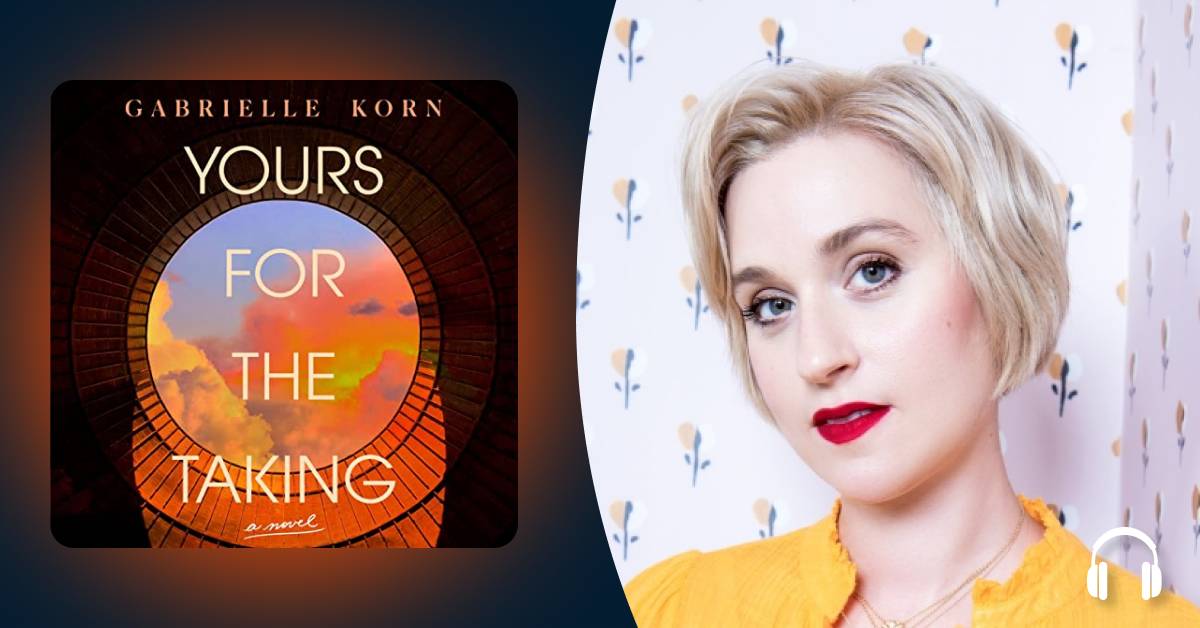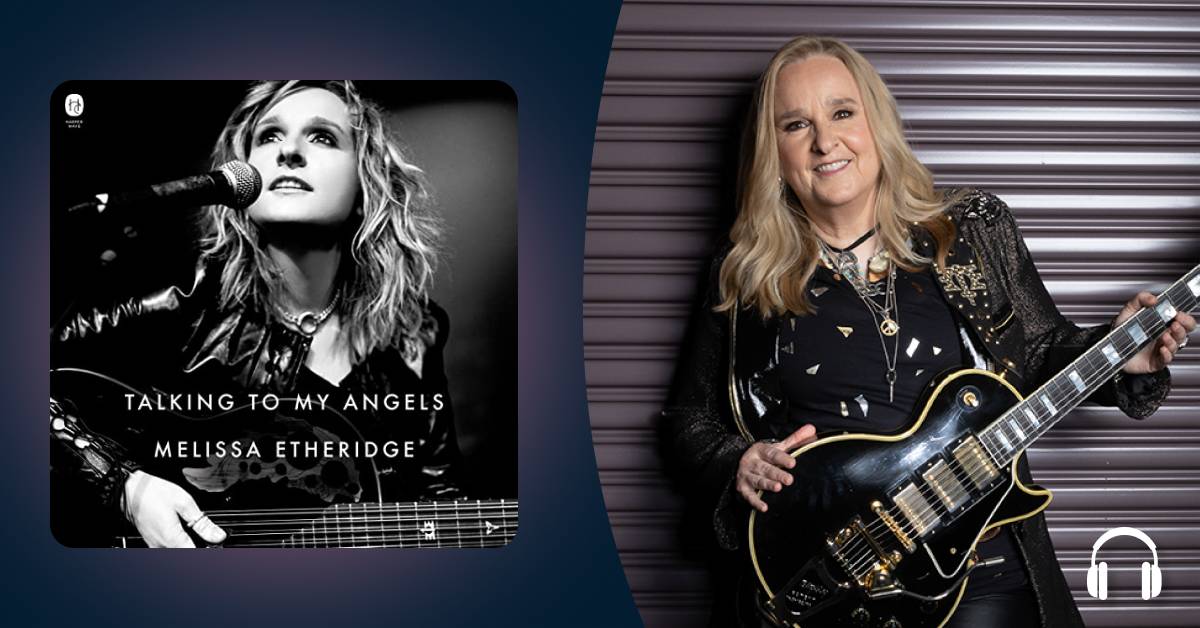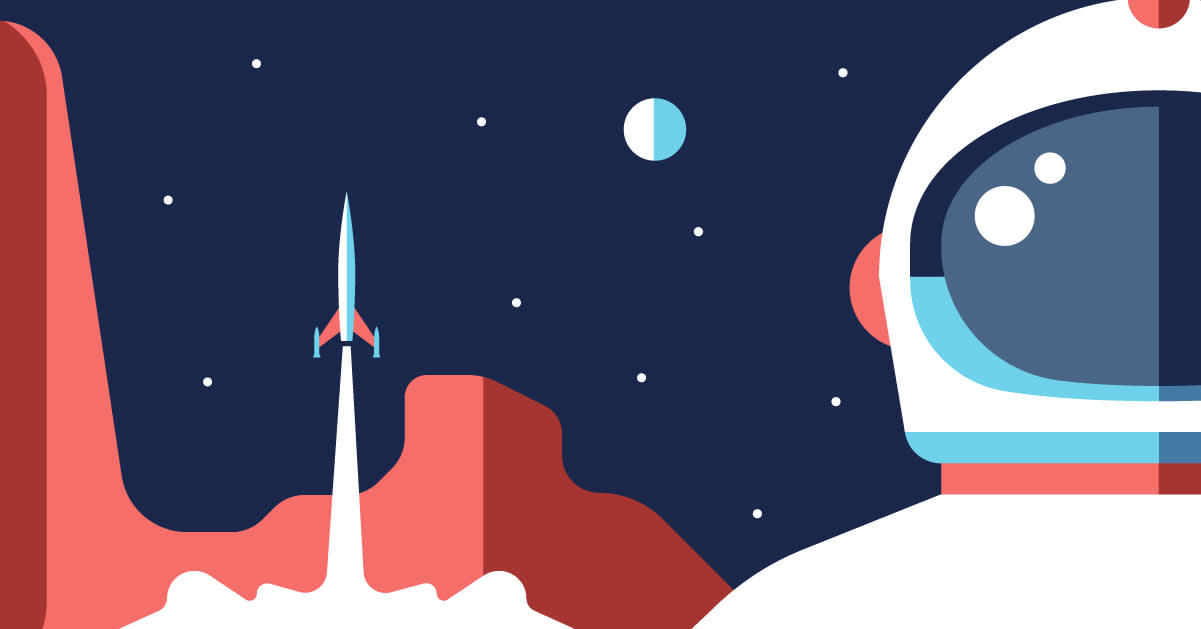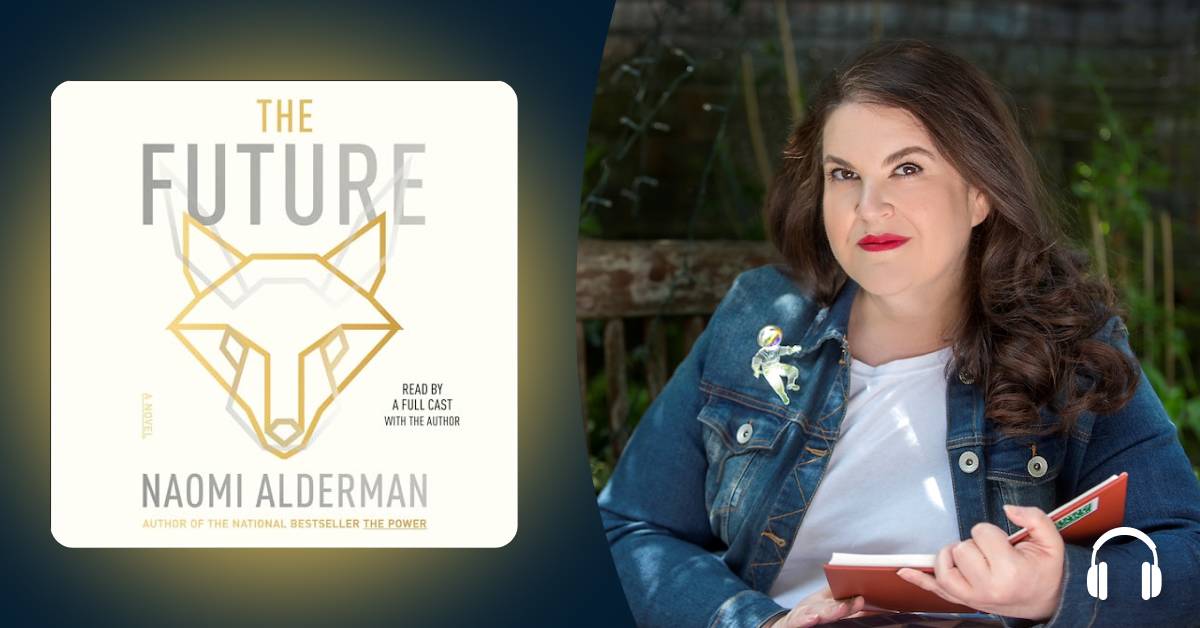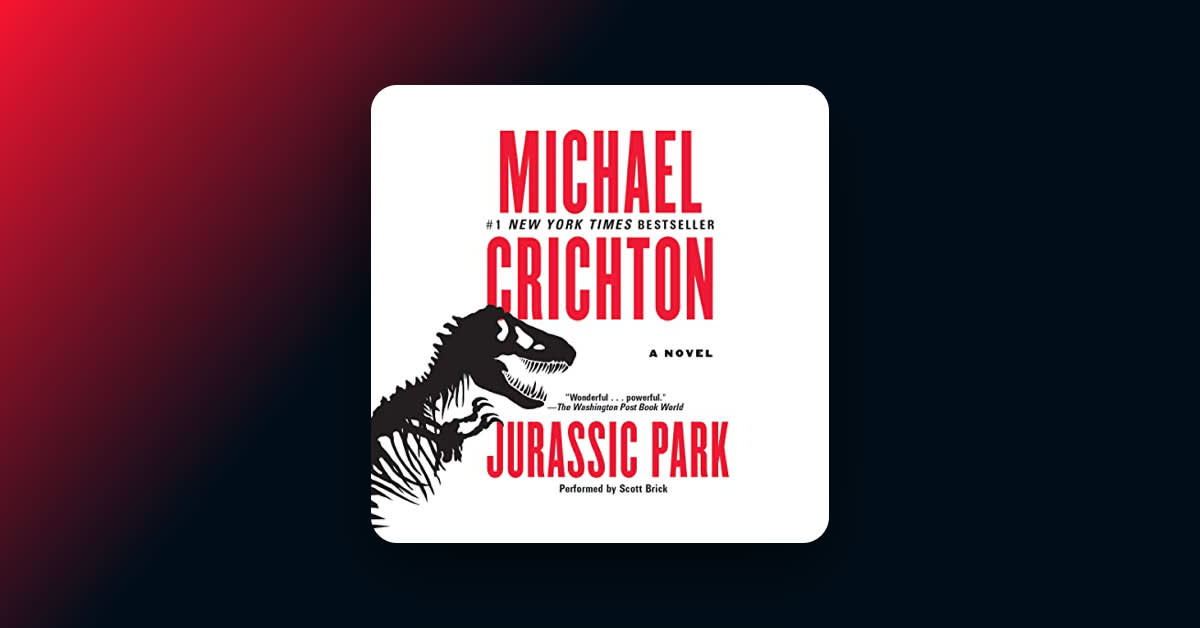Note: Text has been edited and does not match audio exactly.
Madeline Anthony: Hello. I'm Madeline Anthony, an editor here at Audible. And today I'm sitting down with author Gabrielle Korn, who has held titles including the youngest ever editor-in-chief of Nylon and has previously led LGBTQ+ strategy at Netflix. She also penned the 2020 memoir Everybody (Else) Is Perfect. Now, she's adding novelist to her list of credentials with her science fiction debut, Yours for the Taking. Gabrielle, thank you for joining us.
Gabrielle Korn: Thank you so much for having me.
MA: What a journey. I just finished listening on Sunday, and what an experience. It's just such a captivating novel. From the first sentence, I was like, "Okay. I'm in. I'm in." For listeners who haven't heard it yet, the first line of the novel is "Have you ever committed any indecent acts with women?" So, I was like, "Got ’em." Like, "I'm right here with you. Let's do this." There's a lot going on here, which is an understatement. So, I'm curious, for listeners who haven't heard it yet, how would you describe your novel?
GK: Well, first of all, thank you so much. I'm so thrilled that you liked it. I describe it to people as a post-climate change apocalypse, like, end-of-the-world moment about a group of queer people who find themselves coming together under the worst of circumstances.
MA: I'm curious, what was the seed for this? What implanted the seed for this in your mind? What was going on in your life?
GK: I mean, there was a lot going on in my life when I started writing this. I had just left Nylon and gone to Refinery29 to be the fashion director, and my memoir was coming out in a few months. And I just had this feeling, even though things were good, I felt like I was accomplishing things, I also kind of felt like I was on the wrong path. I had just turned 30 and I was just newly aware of the fact that if I wanted to write a novel, which is basically why I became a writer in the first place, I literally just had to write a novel. And I've always been a science fiction fan. It's always the kind of thing I imagined myself doing, and then I never actually did it.
So, I started thinking about what it could look like. And around the same time, there were two separate but connected pieces of information that wormed their way into my brain. The first was that climate change is happening faster than humans can adapt to it, and the second was that we will pass the climate change tipping points before women have equal rights. And I started trying to imagine, "What does that actually mean for what our lives will look like? What does it mean to live in a world where climate change is here and we don't have equality?”
"I think powerlessness is a really dangerous thing to feel because I think it leads to complacency. This is largely a book about that."
I just kept reading all these UN climate reports, and nobody actually wanted to talk about what it would literally look like other than worsening conditions and deadly storms. This was 2019. It was the end of the Trump presidency. There was a kind of nihilism in the air, and anytime there was bad news, I felt like everybody I knew would just be like, "Great. Like, maybe we'll all just die." You know? It was this kind of doom spiral.
And so in the middle of all of this, all of a sudden just, like, the world of Inside came to me. [Note: The Inside Project is a series of city-sized indoor structures people live in to stay safe from climate catastrophes in the book.] I imagined this couple, this queer couple in what's left of Brooklyn, separated by circumstances and the different trajectories their lives take. And then the pandemic started and it was like, "How odd," because I had just written the first three chapters of a book about inside being the safest place to be, and we were all forced to quarantine. And my job cut us down to four days a week, and so I spent every Friday for a year writing, and then I just kind of went from there.
MA: Yeah, it's so harrowing. And maybe it's because I'm probably about the main character's age, I'm queer, I live in Brooklyn, I'm like, "Oh, my God. This is happening." But it's so harrowing, like more so than New York Times pieces I've read that are like, "This is the data. This is what's happening," because it really takes you into "This is what your day-to-day life would be like in climate change." I feel like I think about forests burning and animals going extinct, not trans people, like in Yours for the Taking, having to move to get access to care because people are just focused on the climate emergency. So, I'm wondering, how did you imagine this reality? The world-building is so visceral, so harrowing. Did you do a ton of research, or did you just kind of imagine?
GK: Both. I did do a good ton of research, to the point where I broke my own algorithms, and now the only news I get is climate disasters, which was helpful and also was making me a little bit insane. But I did spend a lot of time just reading as much as possible and really trying to imagine what it actually means for the things that we rely on to live our lives.
And the world-building didn't happen immediately. I will say I feel like I had to layer in the details every time I went back and did a new draft. And my first draft was pretty sparse, and then I was really focused on the relationships because, you know, that's just what is most fun to write [laughs]. But then when I started having friends and family read it, they wanted more world. And so every time I took a pass, I built it out more.
MA: Yeah, like a pack of cigarettes is the equivalent of being outside for an hour, and the retinal scan. Every little detail. And the clothing. That really got me. She's wearing, for listeners, she's wearing recycled, really uncomfortable clothing because they can't make outfits the way that they do today. That kind of thing. It's really chilling. And there's a lot of big themes here, obviously climate change being one of them. The different layers or sides of the feminist coin, I guess, is the way I'll say that. There's really powerful themes. I'm wondering if you had to distill a message or a takeaway that you hope listeners will keep after they listen, what would that be?
GK: That's a good question. I don't really know if there's a singular message. I saw my job more as posing questions that hopefully the reader will then answer for themselves. One of them being when we think about feminism, how can we untangle it from gender essentialism? And how can we center people who have been historically marginalized and oppressed without just creating a mirror image of the power structure that marginalized them in the first place?
MA: And something else that I found that really struck me was your depiction of such an unempathetic government and a government that’s kind of just very inhumane, washes their hands of large factions of people. Some people could argue that the government's doing that now with large factions of people. So, I'm going to quote your words here. After the government says, "We're not responsible. We can't take care of this section of the population," you say, "After the initial riots have been quelled in response to this, nothing else followed." And this was so eerie to me because I feel like this is happening now. I'm thinking about riots after gun violence and riots after Roe was overturned, and BLM protests, and then it's like there's an uptick in anger and then it just fades. Does this sentiment echo how you feel about today's realities?
GK: Absolutely. I mean, I was also thinking about those things. And I just think that, as human beings, we cannot sustain outrage for long enough to fix the issues. Anytime there's a thing, there's an outpouring of anger and action. And then it doesn't do anything, and people give up. And that was happening over the course of writing this book again and again and again about so many different things. And of course, it's happening right now with something new that's also not new at all. And I think powerlessness is a really dangerous thing to feel because I think it leads to complacency. This is largely a book about that, about people who just kind of get maneuvered into situations that maybe aren't great for them long term because they don't think they have a choice. And the reality is they probably had a choice the whole time.
MA: Yeah, that theme of power, and the proximity to power numbing your moral compass, I guess is a good way to put it. That was a theme I saw over and over again. And I kind of like how you just put it out there. You didn't really answer it.
GK: Yeah, I mean, when it comes to power and feminism, et cetera, I think especially as queer women, it's so tempting to want to idolize the idea of a space with no cis men. And I think in a way we've kind of been programmed to want that, right? Because when you get down to it, categories of gender are really flimsy and separatism doesn't work, unfortunately [laughs].
MA: Yeah. I was kind of hoping it would in the beginning [laughs].
GK: No spoilers, but it is such a flawed idea that it has to be doomed from the beginning.
MA: I have to ask about the kind of millennial girl boss-esque brand of feminism, because it just comes up in such strong ways throughout the novel. I saw kind of mirror images of things that we see here in the city. Like, Yours really made me think of The Wing [a former women’s co-working and event space], specifically. I'm wondering, where do you think we could improve as feminists now and where do you think we are at? Do you think that, largely, consciousness is still stuck in that kind of white feminist, ableist, TERF-y space, or do you think we've moved away from that largely? And for listeners who may not know, TERF stands for trans-exclusionary radical feminist.
GK: Yes and no. I feel like Gen Z does a much better job than millennials at understanding intersectionality. And I think, for me, feminism is about equality for everybody. And I think the more we understand what that really means and what that really looks like, the closer we get to a world where more people have access to that, versus people who can afford it, people who look a certain way, et cetera. I also think that, what I know from my years in fashion and beauty, trends are on a 20-year cycle. So, while I don't think that it's realistic that we would have a Jacqueline Millender figure right now because we've already lived through the great girl boss reckoning, I do think that what feels real to me is that 20-ish years from now, everyone will have forgotten the dangers of this and it might kind of happen all over again, only worse, especially given the way social media tends to radicalize people. And whatever you believe, I think social media pushes you further and further into that belief. And I think a character, Jacqueline, comes out of that process.
MA: Yeah. And it's interesting because she is a villain in a sense, but she's not an overt villain, which I think is what you're trying to say. It's funny because I was listening and I was making notes as I was listening. And I wrote down, "Jacqueline is a TERF." And then an hour later, she's like, "Do you think I'm a TERF?" [laughs] That was really funny.
So, something else I really appreciated about this book, was the very real representation. The sex scenes' specifics aren't glossed over. I like how the characters define themselves in different ways, like how Olympia defines herself specifically as a lesbian. And just the breadth of queer characters. I feel like a lot of times we get one or two, but that's not the real—like, all my friends are queer, you know? If you're queer, you're probably living in—you're not the only one. So that's interesting. How did your past professional experience shape how you wanted to represent queerness? And do you think we're actually at a place where we're seeing the correct amount of queer representation right now?
GK: I don't know if we'll ever be seeing the right amount of queer representation, honestly. I just think that content is a business. Corporations look at numbers, and I don't necessarily know if they can look at the numbers of queer people consuming content and have it ever equal the money they spend and have that equation make sense. I've seen behind the scenes of too many places to feel optimistic about it, unfortunately. I do think there are a ton of incredible books and authors, of course. To me, it feels like kind of a silo, unfortunately.
When I was writing it, it was always supposed to be about a group of queer people. Like, there was never a version of this book that was less queer. I mean, there are specific reasons for every single character that exists, but it's like this story doesn't exist without these exact people. And they all play a crucial role. They all experience things differently in a way that hopefully creates a full picture. And in terms of Olympia, I feel like she's the character who I felt the strongest kinship with because she is someone who has this really ardent belief system and just gets totally sucked into something based on a mission. And it turns out to be something else, and she has to come to terms with what she's been complicit in just by participating. And so it was important to me that she be queer as well because I think the temptation is to make your queer characters perfect and—
MA: Yes! I noticed that too, how the first person that Ava hooks up with is kind of a jerk. I'm like, "I love that." Just because you're queer doesn't mean you're an angel. One of my questions for you was, do you see yourself in any of the characters? So, I'm glad that you already told me that. But for me, I really liked Orchid. I feel like there was a depth to her, even though we don't see her as much. And I'm wondering, do you have a favorite character? Are all of these people coming from some kind of seed of someone in your life or someone that you know? I'm curious about the character development.
GK: Yeah, I'm so happy that you liked her because she's also my favorite. And actually, the follow-up to Yours for the Taking does really focus on her.
MA: Oh, cool.
GK: I feel like with her, in the beginning of my writing, she sucked a lot more [laughs]. I kind of dumped a lot of my baggage onto her, just in terms of people I've dated and known, and I wanted her to really represent, like, toxic female masculinity. And then she just became too hateable, and there was no point to hating her. And so I went back and I put a lot of myself into her. And I think what I love the most about her journey and about writing it was, you think she's one thing when you first encounter her, and then when you circle back to her decades later, you find out that she's actually the most sensitive one out of all of them. She's the one who's noticing the beauty and the details of things and feeling things the most strongly and really struggling with feelings of depression and powerlessness. She is impulsive and she is reckless and she is kind of dumb, but, like, [laughs] all of these things, I think, made her feel a lot more real.
MA: So, I'm curious, how long did it take you, from initial ideation to polished, ready to publish. I'm always curious about the creative process and how long it took. Were there many drafts? Did it change a lot?
GK: Yeah, it was probably three years. And like 40 drafts. I did not know how to write a novel when I started writing this novel. The first few tries, I kind of approached it like I was writing an article. I didn't separate out the characters into different chapters. I just wove everything together because when you're writing an article, you're pulling together lots of different threads and weaving them into one. And it just was too confusing. Nobody could follow it.
"And I think, for me, feminism is about equality for everybody. And I think the more we understand what that really means and what that really looks like, the closer we get to a world where more people have access to that, versus people who can afford it, people who look a certain way, et cetera."
So, then I separated everything out, and then I just tried telling the story every way possible. I started at the end and then did everything in flashback. I started at the middle. I had two alternating timelines. And of course, I do think simpler is better, especially when you have an ensemble cast, but it was kind of like, I didn't know how I wanted to tell it until I just told it. And the beginning and the end were always the same, and the middle was always the same. But that last half of the book changed like a million times. I had this feeling like I knew where their plane had to land and I just didn't know how to land the plane.
MA: Were you reading anything or consuming anything specifically while you were writing?
GK: Yeah, I read a lot. I was reading a lot of novels. I was also reading craft books. There were a couple books that came out while I was writing it that were really helpful to me. One was How High We Go in the Dark, which is another kind of climate change-ish novel. And it has a huge cast of characters. And when you start reading it, everything feels like a short story, and then by like two-thirds of the way through, you realize how everything is connected, and then the end goes in a completely different direction. And that was really helpful to me, because it kind of expanded what I felt like I could do. And then I revisited a lot of favorites. I revisited Station Eleven. Never Let Me Go. Books like that.
MA: I'm wondering, because you mentioned climate change again, how close do you think we are to this kind of dystopian reality? Or is this kind of a prediction that you don't actually foresee coming to fruition because, hopefully, you know, changes will be made. Or do you think this is actually something that's dangerously close?
GK: I go back and forth on it. I mean, I have been surprised at the feedback that the book feels really real. Because when I was writing it, I was trying to create an extreme scenario. I wasn't going for real. And I think one thing I took away from my deep dives is that for the first time ever, a lot of people are thinking about climate change and the smartest people in the world are working on it. And I think that's really promising. I think, unfortunately, the thing that keeps me up at night is that it doesn't come down to individual decisions. It comes down to governments and corporations. And they're the ones that have to change things. I don't know. It just seems like there's so much resistance, and I think things are getting worse faster than was predicted. Things like wars certainly aren't helping.
One thing that I worry about is that there's this theory of a climate change doom spiral, which is at a certain point, natural disasters will start happening at such a rapid pace that we won't have time to work on climate change prevention because we'll just be working so hard on disaster-relief efforts. And so that's what makes me nervous.
MA: Another thing that shocked me into awareness through listening to this book was the interconnectedness of everything. I hadn't thought about queer rights being rolled back and I hadn't thought about abortion being illegal as the law of the land. Do you see that as being a reality?
GK: Yes. There has been a historic amount of anti-LGBTQ+ legislation passed in the past couple of years. I feel really scared about the upcoming election. I feel like the left has lost faith in Biden. And I think if we have a Trump presidency or even any Republican presidency next, that's when we're going to start losing our rights. And there are a lot of people like, "The rights are already lost." In so many parts of the country, abortion is illegal. Kids can't get the care they need to transition. You can't say the word gay in school. Books are being banned. That feels really scary and really real to me.
MA: Yeah, absolutely. I'm wondering, I guess, the connection between climate change and queer people losing their rights. You think it's because people's attention, there's only so much people can care about. Is that the correlation that you're seeing?
GK: Yes and no. I mean, I think it's connected in the way that all forms of oppression are connected. I don't necessarily think we know what kind of world we would live in if women and queer people have equal rights. And maybe climate change would've been solved if men weren't mostly in charge of everything. I mean, in the book, the political backdrop I imagined was that the men's rights movement has been so successful that it pushes feminism back into this gender essentialism way of thinking. And that is connected to climate change because I think when lives are at risk, thinking gets very black-and-white.
MA: So, about the narration of the book itself, did you have a hand in choosing the narrator? I really liked her [Jasmin Savoy Brown]. I thought she did great voices. I always knew when it was Jacqueline specifically, and she did a great job of transitioning from characters. But did you have a hand in choosing her?
GK: Yes. Jasmin is my friend. We met many years ago on set. We were doing a profile on her for Nylon when she was in The Leftovers, and we just kind of really hit it off with each other and stayed in touch. When I was at Netflix, I produced a podcast that she hosted. We just really enjoy working with each other, and she was the first person I thought of. I was so thrilled that she wanted to do it and that she's been a fan of the book.
MA: That's awesome. Yeah, she does a great job.
GK: She's amazing.
*Warning: spoilers ahead*
MA: So, this is my last question. For any listeners who haven't heard Yours for the Taking yet, tune out now. It's going to be a spoiler. So, you end the novel with such a cliffhanger. Do Ava and Orchid get together in the end? I feel like they do. This is what I've decided. And why did you make the choice to leave it so open-ended?
GK: Yeah. I mean, there's a whole other book coming. It's called The Shutouts. It's coming out December 2024. And you will have that question answered. The book is both a prequel and a sequel. It's more of, like, from the world of Yours for the Taking. We do pick up with Orchid and Ava where we left them, but it also introduces two new characters. We don't figure who they are or why they're relevant until the latter half of the book. But one of them is a woman who's racing across the country trying to get back her daughter who she has abandoned, and the other is 40 years later, someone who is escaping a cult in Washington state. And it's alternating timelines. And that is all I'm going to give away [laughs].
MA: Well, thank you so much, Gabrielle, for being here with us. It's a pleasure to be in conversation with you. And listeners, you can get Yours for the Taking by Gabrielle Korn on Audible today.
GK: Thank you so much.
